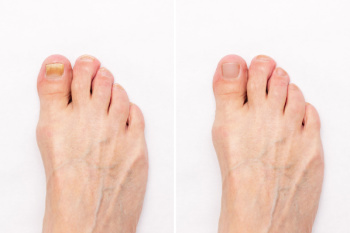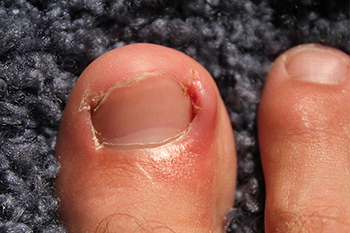
Toenail fungus is an infection that affects the toenail and the skin underneath it. It often causes the nail to become thick, yellow, and brittle, or to lift away from the nail bed. Fungal toenails are more common in older adults, especially those with diabetes, poor circulation, or a weakened immune system. Fungus grows well in warm, damp places like sweaty shoes. For that reason, people who wear tight or closed shoes for long hours or use shared shower areas may be more likely to be exposed. The infection usually starts slowly and can become worse over time if not treated. Because toenails grow slowly and have less blood flow than other parts of the body, treating a fungal nail infection can take several months. A podiatrist may prescribe oral medication to fight the infection from the inside, or use topical treatments for mild cases. In more serious situations, surgery to remove the damaged nail might be recommended. If you have been infected with a toenail fungus, it is suggested that you make an appointment with a podiatrist for treatment.
If left untreated, toenail fungus may spread to other toenails, skin, or even fingernails. If you suspect you have toenail fungus it is important to seek treatment right away. For more information about treatment, contact Gerard Skaziak, DPM of Lakeview Family Foot Care. Our doctor can provide the care you need to keep you pain-free and on your feet.
Symptoms
- Warped or oddly shaped nails
- Yellowish nails
- Loose/separated nail
- Buildup of bits and pieces of nail fragments under the nail
- Brittle, broken, thickened nail
Treatment
If self-care strategies and over-the-counter medications does not help your fungus, your podiatrist may give you a prescription drug instead. Even if you find relief from your toenail fungus symptoms, you may experience a repeat infection in the future.
Prevention
In order to prevent getting toenail fungus in the future, you should always make sure to wash your feet with soap and water. After washing, it is important to dry your feet thoroughly especially in between the toes. When trimming your toenails, be sure to trim straight across instead of in a rounded shape. It is crucial not to cover up discolored nails with nail polish because that will prevent your nail from being able to “breathe”.
In some cases, surgical procedure may be needed to remove the toenail fungus. Consult with your podiatrist about the best treatment options for your case of toenail fungus.
If you have any questions, please feel free to contact our offices located in Guntersville and Albertville, AL . We offer the newest diagnostic and treatment technologies for all your foot care needs.

An ingrown toenail develops when the edge of the nail grows into the skin along the side of the toe, often causing pain, swelling, and sometimes infection. When an ingrown toenail does not improve or worsens, a podiatrist may recommend a medical procedure. One common option is a partial nail avulsion, which involves numbing the toe with a local anesthetic and then removing only the part of the nail that is growing into the skin. This reduces pressure and allows the toe to heal. If ingrown toenails keep coming back on the same toe, a matrixectomy may be performed during the same visit. This procedure removes or destroys the nail root, called the matrix, so that part of the nail will not grow back. This procedure can be done using a chemical, heat from an electric device, or a surgical instrument. If there is an infection, a podiatrist may also prescribe oral antibiotics to kill the bacteria. If you have a problematic ingrown toenail, it is suggested that you schedule an appointment with a podiatrist for an exam, diagnosis, and safe treatment.
Ingrown toenails can become painful if they are not treated properly. For more information about ingrown toenails, contact Gerard Skaziak, DPM of Lakeview Family Foot Care. Our doctor can provide the care you need to keep you pain-free and on your feet.
Ingrown Toenails
Ingrown toenails occur when a toenail grows sideways into the bed of the nail, causing pain, swelling, and possibly infection.
Causes
- Bacterial infections
- Improper nail cutting such as cutting it too short or not straight across
- Trauma to the toe, such as stubbing, which causes the nail to grow back irregularly
- Ill-fitting shoes that bunch the toes too close together
- Genetic predisposition
Prevention
Because ingrown toenails are not something found outside of shoe-wearing cultures, going barefoot as often as possible will decrease the likeliness of developing ingrown toenails. Wearing proper fitting shoes and using proper cutting techniques will also help decrease your risk of developing ingrown toenails.
Treatment
Ingrown toenails are a very treatable foot condition. In minor cases, soaking the affected area in salt or antibacterial soaps will not only help with the ingrown nail itself, but also help prevent any infections from occurring. In more severe cases, surgery is an option. In either case, speaking to your podiatrist about this condition will help you get a better understanding of specific treatment options that are right for you.
If you have any questions please feel free to contact our offices located in Guntersville and Albertville, AL . We offer the newest diagnostic and treatment technologies for all your foot and ankle needs.

An Achilles tendon tear is a painful injury that often occurs during activities that involve sudden starts, stops, or pivots, especially in sports or while running. The Achilles tendon, which connects the calf muscles to the heel bone, is essential for walking, running, and rising onto the toes. A torn Achilles tendon may happen suddenly, often with a popping sound, followed by sharp pain at the back of the ankle. Patients may find it difficult to push off the foot or stand on their toes. In many cases, the foot may exhibit abnormal movement, including excessive pronation or supination, which can place strain on the tendon. A podiatrist can examine your ankle and foot alignment, assess range of motion, and determine the extent of the tear using diagnostic tests. If the tendon is completely torn, surgery may be required to restore function. A podiatrist can also help guide you through non-surgical recovery methods, including immobilization, and provide support for proper foot biomechanics. If you have injured your Achilles tendon, it is suggested that you make an immediate appointment with a podiatrist for an exam, diagnosis, and treatment.
Achilles tendon injuries need immediate attention to avoid future complications. If you have any concerns, contact Gerard Skaziak, DPM of Lakeview Family Foot Care. Our doctor can provide the care you need to keep you pain-free and on your feet.
What Is the Achilles Tendon?
The Achilles tendon is a tendon that connects the lower leg muscles and calf to the heel of the foot. It is the strongest tendon in the human body and is essential for making movement possible. Because this tendon is such an integral part of the body, any injuries to it can create immense difficulties and should immediately be presented to a doctor.
What Are the Symptoms of an Achilles Tendon Injury?
There are various types of injuries that can affect the Achilles tendon. The two most common injuries are Achilles tendinitis and ruptures of the tendon.
Achilles Tendinitis Symptoms
- Inflammation
- Dull to severe pain
- Increased blood flow to the tendon
- Thickening of the tendon
Rupture Symptoms
- Extreme pain and swelling in the foot
- Total immobility
Treatment and Prevention
Achilles tendon injuries are diagnosed by a thorough physical evaluation, which can include an MRI. Treatment involves rest, physical therapy, and in some cases, surgery. However, various preventative measures can be taken to avoid these injuries, such as:
- Thorough stretching of the tendon before and after exercise
- Strengthening exercises like calf raises, squats, leg curls, leg extensions, leg raises, lunges, and leg presses
If you have any questions please feel free to contact our offices located in Guntersville and Albertville, AL . We offer the newest diagnostic tools and technology to treat your foot and ankle needs.

